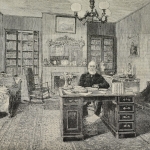So fallen! so lost! the light withdrawn
Which once he wore!
The glory from his gray hairs gone
Forevermore!
Revile him not, the Tempter hath
A snare for all;
And pitying tears, not scorn and wrath,
Befit his fall!
Oh, dumb be passion’s stormy rage,
When he who might
Have lighted up and led his age,
Falls back in night.
Scorn! would the angels laugh, to mark
A bright soul driven,
Fiend-goaded, down the endless dark,
Let not the land once proud of him
Insult him now,
Nor brand with deeper shame his dim,
Dishonored brow.
But let its humbled sons, instead,
From sea to lake,
A long lament, as for the dead,
In sadness make.
Of all we loved and honored, naught
Save power remains;
A fallen angel’s pride of thought,
Still strong in chains.
All else is gone; from those great eyes
The soul has fled:
When faith is lost, when honor dies,
The man is dead!
Then, pay the reverence of old days
To his dead fame;
Walk backward, with averted gaze,
And hide the shame!

Comment form: